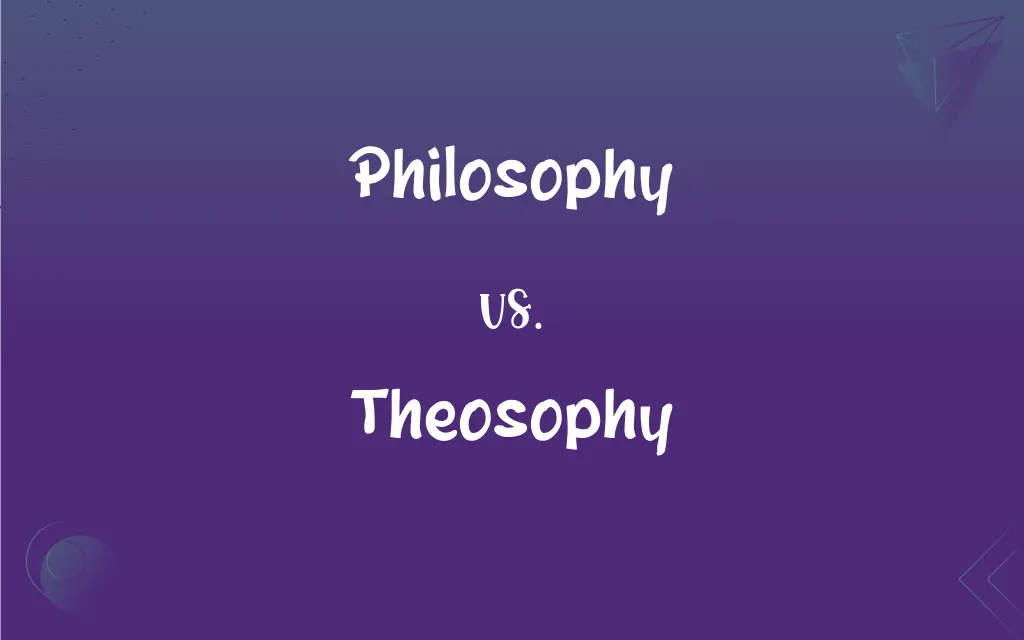Philosophy vs. Theosophy: What's the Difference?
Edited by Aimie Carlson || By Janet White || Published on December 6, 2023
Philosophy is the study of fundamental nature of knowledge, reality, and existence, often using rational argument. Theosophy is a belief system combining mystical and esoteric insights to understand divine or metaphysical truths.

Key Differences
Philosophy involves critical thinking and logical analysis of existence, knowledge, values, and reason. Theosophy, in contrast, focuses on mystical and spiritual understanding of the divine or the universe.
Philosophers use rational argument and empirical evidence to explore ethical, metaphysical, and epistemological issues. Theosophists employ mystical experiences and esoteric knowledge to explore spiritual enlightenment and deeper truths.
Philosophy is rooted in ancient academic traditions and is considered a discipline in humanities. Theosophy, emerging in the 19th century, blends various religious and spiritual traditions to create a unique spiritual framework.
Philosophy often challenges established beliefs through questioning and debate. Theosophy, meanwhile, accepts certain spiritual truths as given and seeks to understand them through mystical insight and inner experiences.
In philosophy, there's a focus on understanding human thought, behavior, and society. Theosophy leans towards exploring the mystical connection between the human and the divine, often transcending rational and empirical boundaries.
ADVERTISEMENT
Comparison Chart
Nature of Study
Rational analysis of knowledge and existence
Mystical insight into divine or spiritual truths
Method of Exploration
Logical argument, empirical evidence
Mystical experiences, esoteric teachings
Historical Roots
Ancient academic discipline
19th-century movement blending various traditions
Approach to Beliefs
Questioning and debate
Acceptance of spiritual truths
Focus
Human thought, behavior, and society
Connection between human and divine
ADVERTISEMENT
Philosophy and Theosophy Definitions
Philosophy
A discipline focusing on rational argument and empirical evidence.
The course covered philosophy from Socrates to modern thinkers.
Theosophy
Belief system focusing on mystical understanding of the divine.
He studied theosophy to deepen his spiritual insights.
Philosophy
Philosophical inquiry into ethical, metaphysical, and epistemological issues.
His interest in philosophy led him to question societal norms.
Theosophy
A movement seeking to reveal deeper metaphysical truths.
Theosophy often delves into the mysteries of the universe.
Philosophy
Study of fundamental nature of knowledge and existence.
His philosophy thesis explored the nature of reality.
Theosophy
An approach accepting spiritual truths and seeking understanding.
Through theosophy, she sought to connect with the divine.
Philosophy
A framework for understanding human thought and society.
Her philosophy of life was grounded in principles of kindness.
Theosophy
Spiritual framework blending various religious and mystical traditions.
The theosophy seminar discussed esoteric teachings.
Philosophy
Logical analysis and critical thinking about human existence.
She applied philosophy to understand ethical dilemmas.
Theosophy
Exploration of spiritual enlightenment through inner experiences.
Her theosophy practices led her to a profound inner peace.
Philosophy
The study of the nature, causes, or principles of reality, knowledge, or values, based on logical reasoning.
FAQs
Can philosophy be spiritual?
Philosophy can explore spiritual themes but relies on rational argument.
Is theosophy a religion?
Theosophy is not a religion, but a spiritual belief system blending various traditions.
Are philosophers interested in empirical evidence?
Yes, philosophers often use empirical evidence in their analyses.
What is philosophy?
Philosophy is the study of fundamental aspects of knowledge, reality, and existence.
Do theosophists follow a specific doctrine?
Theosophists draw from various sources but don't follow a single doctrine.
What does theosophy focus on?
Theosophy focuses on mystical and esoteric understanding of divine truths.
Does theosophy incorporate elements from Eastern religions?
Yes, theosophy often incorporates elements from Eastern spiritual traditions.
Can theosophy be practiced individually?
Yes, theosophy can be practiced individually through personal study and meditation.
Do philosophers believe in a higher power?
Philosophy doesn't inherently involve belief in a higher power; it varies by philosopher.
Is philosophy taught in universities?
Yes, philosophy is a recognized academic discipline in universities.
How does theosophy view the material world?
Theosophy often views the material world as a manifestation of deeper spiritual realities.
What are the main branches of philosophy?
The main branches include metaphysics, epistemology, ethics, and aesthetics.
How does philosophy approach the concept of truth?
Philosophy approaches truth through logical reasoning and critical analysis.
Do theosophists practice meditation?
Meditation is often a key practice in theosophy for spiritual exploration.
Is theosophy a structured belief system?
Theosophy has core ideas but allows for individual interpretation and exploration.
Can theosophy be integrated with other belief systems?
Yes, theosophy often integrates with other spiritual or religious beliefs.
Is theosophy connected to any historical figures?
Theosophy was notably promoted by figures like Helena Blavatsky in the 19th century.
Can philosophy influence ethics?
Yes, philosophy deeply explores and can influence ethical thought and principles.
Are philosophical theories testable?
Some philosophical theories can be tested, while others are more speculative.
Can philosophy be applied in daily life?
Yes, many philosophical principles can be applied to everyday situations and decisions.
About Author
Written by
Janet WhiteJanet White has been an esteemed writer and blogger for Difference Wiki. Holding a Master's degree in Science and Medical Journalism from the prestigious Boston University, she has consistently demonstrated her expertise and passion for her field. When she's not immersed in her work, Janet relishes her time exercising, delving into a good book, and cherishing moments with friends and family.
Edited by
Aimie CarlsonAimie Carlson, holding a master's degree in English literature, is a fervent English language enthusiast. She lends her writing talents to Difference Wiki, a prominent website that specializes in comparisons, offering readers insightful analyses that both captivate and inform.






































































